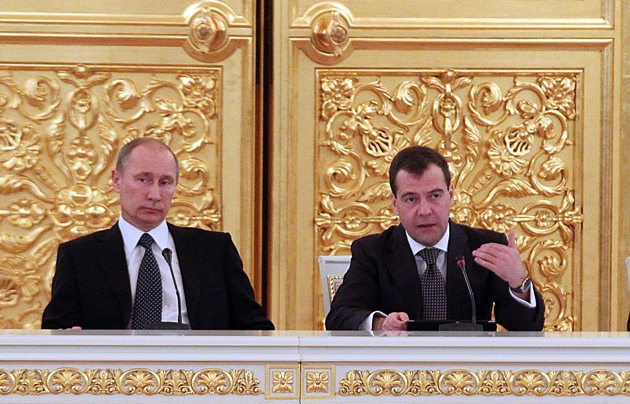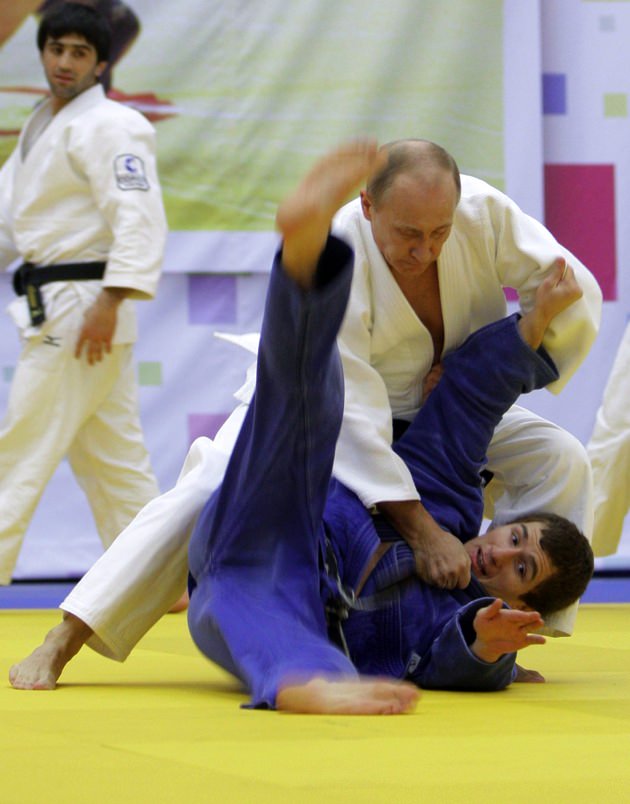This is the third in an NYRblog series about the fate of democracy in different parts of the world.
Judging from his outburst last week during a televised meeting with Russian media chiefs, Russian Prime Minister Vladimir Putin is getting rattled by the increasingly vocal opposition to the Kremlin. In a tense exchange with Aleksei Venediktov, editor of the radio station Ekho Moskvy, a key forum for the opposition, Putin recounted how he had listened to the radio during a ski trip with President Dmitry Medvedev and was shocked to hear a broadcast that was favorable to the planned US missile defense system, which the Kremlin vehemently opposes. Although Venediktov remained calm and deferential, Putin then blurted out: “I see that you are upset with me. I see it in your face. Why? I do not take offense when you pour diarrhea on me day in and day out, and yet you have taken offense.”
This is not the first time that Putin has reverted to scatological language when angry and defensive. (Who can forget his public vow, made after the September 1999 terrorist bombings in Russia, for which Chechens were blamed, that Chechen rebels would be “wiped out in their outhouses?”) But it offers some indication of the blackening mood inside the Kremlin as it contemplates the March 4 presidential election, now less than six weeks away. As recently as late November, Putin’s smooth return to the presidency for six and perhaps twelve more years seemed virtually assured; then there were the December 4 Duma elections, marred by allegations of widespread fraud, and everything changed, with demonstrators taking to the streets by the tens of thousands.
For the moment, polls suggest that Putin still has a good chance of winning the presidency in the first round of elections. Even though his popularity has declined, Putin’s carefully cultivated image as a strong and decisive leader who defends Russia’s national interests appears to have retained him support across a broad swath of Russia’s population, and no viable alternative to him has emerged thus far. If unexpectedly large numbers turn out for the opposition protests scheduled for February 4, however, it could undermine his candidacy and force him into an unpredictable second round. This is a situation the Kremlin wants to avoid at all costs.
But how to do it? For much of the past decade, Putin’s Kremlin was able to consolidate and maintain its power by providing enough economic benefits for middle-class Russians to keep them quiet and marginalizing the democratic opposition through its control of the mainstream media. With the sudden surge in protests on the street and on the Internet, however, the old formula may no longer work. Which leaves two possibilities: a vigorous reform effort, or more drastic steps to insure the election outcome.
Certainly Kremlin leaders recognize that they must give some credence to the protesters. This may explain why, for the first time in five years, the leading democratic oppositionist Boris Nemtsov was interviewed in mid-January on a Kremlin-controlled television channel. And just a few days after Putin’s meeting with the media, President Medvedev, always the nice guy, invited a group of 15 Russian news editors, including the maligned Venediktov, to a private dinner on January 21 in the Russian resort of Sochi, on the Black Sea. The gathering was supposed to be secret, but Venediktov and other participants later wrote about the meeting in their blogs. They said that Medvedev discussed the protests against the Duma elections in Moscow and other cities, and also the issue of missile defense, which has badly strained relations between the US and Russia. (The decision of the new American Ambassador, Michael McFaul, to meet with members of the opposition just after his arrival last week doubtless has added further to the tension by reinforcing the Kremlin’s claim that the US is fomenting Russia’s domestic opposition.)
According to one guest, Medvedev seemed to have been deeply affected by the protests and took them seriously. Indeed, in his annual address to the Federal Assembly on December 22, Medvedev proposed significant electoral reforms, including the reinstatement of direct elections for regional governors and a simplification of the procedure for registering political parties and candidates. But the bill on election reform, which Medvedev just submitted to the Duma, contains provisions that dilute its impact considerably; and in any case, it is not scheduled to be passed until May, so the proposed reforms will not affect the March presidential elections.
These limitations seem to reflect the reality that Medvedev has relinquished his political future to Putin by giving up the possibility of a second presidential term last September, and is unwilling or unable to stick his neck out too far. This week, he postponed a meeting with his human rights council for the fourth time, citing a busy schedule. Members of the council, including the veteran democratic activist Lyudmila Alekseyeva, had hoped to discuss with the president their 400-page report arguing that the prison sentence of former oil tycoon Mikhail Khodorkovsky was illegal. In the view of Alekseyeva, “the President has more important things to do than to protect the rights of his citizens.”
Advertisement
Medvedev’s conciliatory gestures may merely be cover as the Russian leadership prepares a different kind of response to the precarious situation. Andrei Illarionov, who served as Putin’s chief economic advisor from 2000 to 2005 and is now a supporter of the political opposition, has predicted that if people continue to take to the streets, Putin will “take revenge” by instituting a major crackdown, including a state of emergency that would muzzle the media and prevent demonstrations.
Ominously, Illarionov says that a terrorist attack or an assassination would justify such actions on the part of the Kremlin. Far-fetched as this possibility might seem, it is useful to recall that Putin’s rise to power was largely a result the above-mentioned bombings in September 1999 (bombings that many attribute to Putin’s security services, the FSB), which also served as the justification for the second war in Chechnya. And the tragic terrorist attack at the school in Beslan, North Ossetiya in September 2004 (where again FSB involvement was suspected) led to a marked strengthening of Putin’s power because he used the attack to put an end to elections for regional governors and to direct elections for part of the Duma.
Whatever Putin’s intentions, his recent tough talk could encourage elements within the FSB to take their own initiative. (As one observer noted of Putin’s comments at the media session, “with language like this flying around in a semi-public gathering, one can only imagine the conversations taking place in the prime minister’s entourage.”) Although Putin and his supporters in the Kremlin have formal authority over the FSB, their control over this notoriously corrupt agency is by no means absolute, as evidenced by the problems Putin has had in preventing conflicts within the FSB from leaking out in public. And the FSB has an especially strong political and financial stake in keeping Putin in power.
Hopefully such extreme measures will be avoided and Russia’s political future will not be determined by violence and bloodshed. But it seems likely the Kremlin will do what it can to manipulate the outcome of the election. Indeed, it has already been taking steps in that direction. This week, Russia’s Central Election Commission ruled that Grigory Yavlinsky, co-founder of the democratic Yabloko Party, had too many invalid signatures to be allowed on the ballot. Also Golos, the independent group that monitors elections, has reported that the owners of the building where it rents offices in Moscow have ordered the group to move out, apparently because of pressure from Russian authorities. And Russia’s courts, notorious for taking orders from the Kremlin, have tossed out the many complaints of election fraud filed against Putin’s United Russia Party after the December parliamentary vote. Whether or not Russian authorities go so far as to arrest leaders of opposition protests over the next few weeks, as they did in December, is another question.
As Michael Bohm of The Moscow Times observed recently, Putin cannot afford to give up power because he and his cronies would end up being jailed for corruption: “The best, and perhaps only, guarantee of securing immunity for Putin—and dozens of his friends and colleagues who have become millionaires and billionaires over the past 10 years through their Kremlin-connected businesses—against possible corruption and other criminal charges is to remain in power.” Whatever strategies the Kremlin adopts and whatever the response on the part of the Russian people, it is unlikely that Putin, a judo champion in his youth, will exit the political stage quietly.




